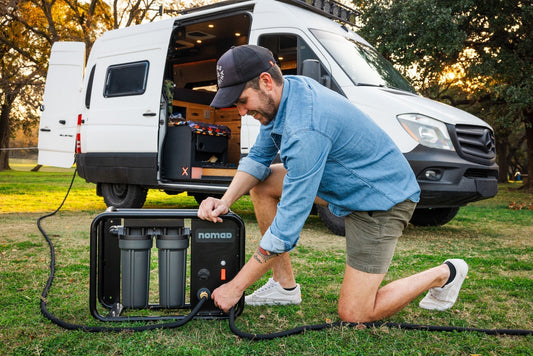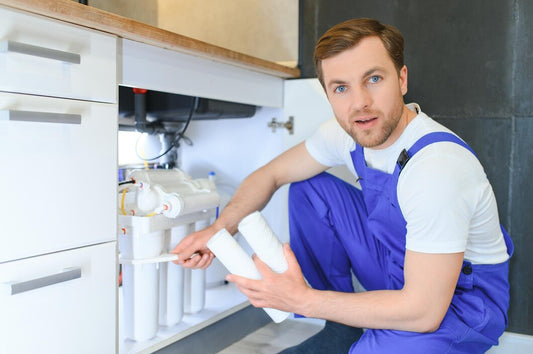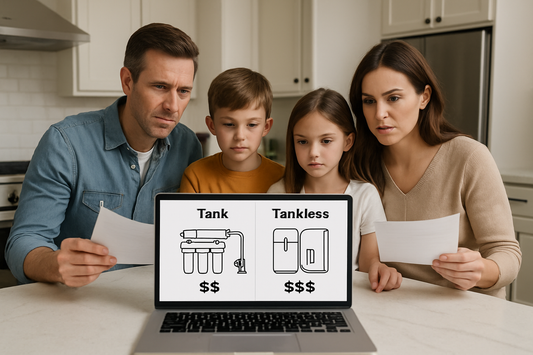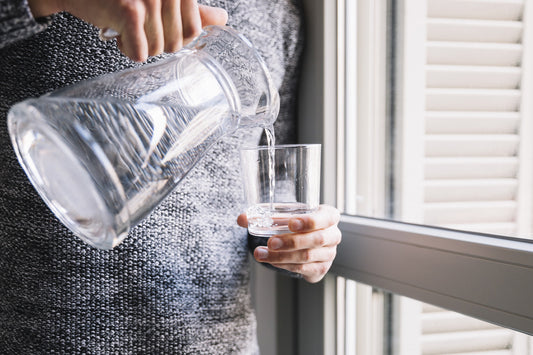You're parked at a stunning lakeside campground, the sun is setting, and you're ready to cook dinner. But when you turn on your RV's water tap, the water tastes like chlorine and looks questionable. This scenario plays out for thousands of RVers every year, but it doesn't have to be your reality.
Whether you're a weekend warrior or a full-time nomad, having reliable access to clean, great-tasting water is essential for any successful RV adventure. The good news? With the right RV water filter system, you can enjoy pure, safe water no matter where your travels take you.
Why Your RV Needs a Dedicated Water Filter System
RV water systems face unique challenges that home filtration systems simply aren't designed to handle. When you're connecting to different water sources across the country, you're essentially playing water quality roulette. Some campgrounds have excellent water, while others might have high chlorine levels, sediment, or even more concerning contaminants.
Your motorhome water filter serves as your first line of defense against these inconsistencies. Unlike stationary home systems, RV filters need to handle varying water pressures, different connection types, and the constant vibration from travel. They're built tough because they need to be.
The health implications alone make investing in a quality RV camper water filter a no-brainer. Poor water quality can lead to digestive issues, skin irritation, and can even damage your RV's plumbing system over time. Hard water, common in many regions, can leave mineral deposits that clog fixtures and reduce the lifespan of your water heater.
Understanding RV Water Filtration: The Basics
Before diving into specific systems, it's crucial to understand how RV water filtration works. Most RV water filter systems use a multi-stage approach, combining different filtration technologies to tackle various contaminants.
The first stage typically involves sediment filtration, removing visible particles like dirt, rust, and debris. This protects your RV's internal plumbing and prevents larger particles from reaching more sensitive filtration stages.
Next comes activated carbon filtration, which handles chlorine, chloramines, and many organic compounds that affect taste and odor. This is where you'll notice the most dramatic improvement in your water's palatability.
Some advanced systems include additional stages like UV sterilization or reverse osmosis, providing hospital-grade water purification. These are particularly valuable for international travel or when accessing water from questionable sources.

Choosing the Right System for Your Adventure Style
Not all RV water filters are created equal, and the best system for you depends on your specific travel style and needs. Weekend campers who primarily stay at established campgrounds have different requirements than full-time RVers exploring remote areas.
For occasional RVers who stick to developed campgrounds, a basic inline outdoor water filter might suffice. These systems are affordable, easy to install, and provide adequate protection against common contaminants like chlorine and sediment.
Full-time RVers and those who frequently boondock need more robust systems. A comprehensive RV water filter system with multiple stages, higher capacity, and broader contaminant removal becomes essential when you're relying on well water, lake water, or other untested sources.
Consider your storage space, budget, and maintenance preferences. Some systems require frequent filter changes, while others are designed for longer intervals between maintenance. Factor in the cost of replacement filters when making your decision.
Installation Made Simple: Setting Up Your System
Installing an RV water filter system is more straightforward than many people assume. Most systems are designed for easy DIY installation, requiring only basic tools and a few hours of your time.
The most common setup involves connecting your filter system between your freshwater hose and your RV's water inlet. This ensures all water entering your RV passes through the filtration system. You'll need to ensure proper flow direction and secure all connections to prevent leaks.
For motorhome water filter systems, pay special attention to mounting location. The filter should be easily accessible for maintenance but protected from road debris and extreme temperatures. Many RVers mount their systems in a bay or under a protective cover.
Always test your system thoroughly before hitting the road. Check for leaks, verify proper flow rates, and ensure all connections are secure. A failed connection at a remote campsite can quickly turn a great trip into a soggy disaster.
Maintenance: Keeping Your System Running Smoothly
Regular maintenance is crucial for any RV camper water filter system. Unlike home systems that operate in controlled environments, RV filters work harder and face more variables. This means more frequent attention and replacement schedules.
Most carbon filters need replacement every 3-6 months, depending on usage and water quality. Sediment filters might need more frequent changes if you encounter particularly dirty water sources. Keep a log of your filter changes and water sources to identify patterns and optimize your maintenance schedule.
Monitor your water flow rate and taste regularly. Decreased flow or returning off-tastes are early indicators that filter replacement is needed. Don't wait until performance is severely compromised – proactive maintenance ensures consistently clean water.
Store spare filters in your RV, but protect them from extreme temperatures and humidity. Damaged filters can actually make your water quality worse, so proper storage is essential.
Advanced Options: Beyond Basic Filtration
For RVers who demand the highest water quality, advanced filtration options open up new possibilities. UV sterilization systems can eliminate bacteria and viruses that standard filters miss. These are particularly valuable for international travel or when accessing surface water sources.
Reverse osmosis systems provide the ultimate in water purification, removing virtually all contaminants including dissolved solids, heavy metals, and microorganisms. While more expensive and complex, they're ideal for full-time RVers with health sensitivities or those frequently accessing questionable water sources.
Some modern systems integrate smart monitoring, alerting you when filters need replacement or when water quality issues are detected. These systems take the guesswork out of maintenance and provide peace of mind.

Troubleshooting Common Issues
Even the best RV water filter system can encounter problems. Low water pressure is often caused by clogged filters, kinked hoses, or air bubbles in the system. Regular maintenance and proper installation prevent most pressure issues.
Strange tastes or odors returning despite recent filter changes might indicate a bacterial bloom in your freshwater tank. This requires tank sanitization, not just filter replacement. Make tank cleaning part of your regular maintenance routine.
Leaks at connection points usually result from worn O-rings or improper installation. Keep spare O-rings and connection hardware in your RV toolkit for quick repairs.
The Investment That Pays Off
Quality outdoor water filter systems represent a significant upfront investment, but they pay dividends in health, convenience, and peace of mind. When you factor in the cost of bottled water, potential health issues from poor water quality, and the enhanced enjoyment of your travels, the math becomes clear.
Consider your filtration system as essential RV infrastructure, not an optional accessory. Just as you wouldn't travel without proper tires or brakes, reliable water filtration is fundamental to safe, enjoyable RVing.
The confidence that comes from knowing you have clean, safe water anywhere you park is invaluable. Whether you're exploring national parks, visiting family, or living the full-time RV dream, your water filter system ensures that hydration never becomes a concern.
FAQs
How often should I replace my RV water filter?
Replace carbon filters every 3-6 months and sediment filters every 2-3 months, depending on usage and water quality. Monitor flow rate and taste as indicators.
Can I use a regular home water filter on my RV?
Home filters aren't designed for RV use and may not handle varying pressures or vibration. Use filters specifically designed for RV applications.
Do I need different filters for different seasons?
While the same filter works year-round, consider more frequent changes during heavy-use seasons or when encountering particularly poor water sources.
How do I know if my RV water filter is working?
Monitor water taste, odor, and clarity. Most systems also show decreased flow rate when filters need replacement.
Can I install an RV water filter myself?
Yes, most RV water filters are designed for DIY installation with basic tools. Follow manufacturer instructions carefully and test thoroughly.





